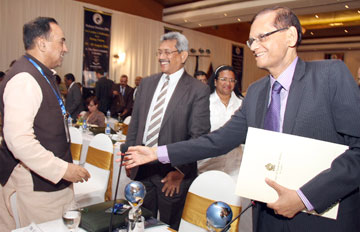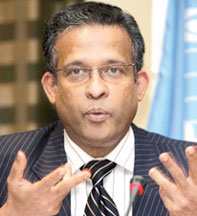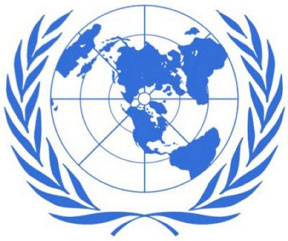|
Opinion:
Indian government gets tough against terrorism
by K.M.H.C.B. Kulatunga
Chairman of the BJP Committee on Strategic Action and BJP's National
Executive Committee Member Subramanian Swamy's forthright statement at
last week's Sri Lanka Defence Seminar 2014 was an eye-opener to all.
 |
|
BJP's National Executive
Committee Member Dr Subramanian Swamy with Defence Ministry
Secretary Gotabaya Rajapaksa and Minister G L. Pieris. |
Speaking on the final day of the fourth Defence Seminar organised by
the Sri Lanka Army, Dr. Swamy said that what took place in Sri Lanka was
not an ethnic struggle but a linguistic struggle.
Hardly has anybody deeply examined the root causes for LTTE terrorism
in Sri Lanka, which many in the West have described as an ethnic
problem. As Dr. Swamy correctly pointed out, it had been a struggle due
to language barriers and not due to ethnicity.
As we have pointed out regularly, the Tamils in the North and the
East had not encountered any specific problems due to ethnicity. The
people in the two provinces had their own problems due to the
geographical locations but those were not only confined to Tamils but
also to the Sinhalese and Muslims living in the two provinces.
Tough stance
Moreover, the linguistic struggle of the people in the North and the
East was not only a problem for Tamils in the area but also the Muslims
living in the two provinces. Hence, there is no truth in Western
theories that Sri Lanka has an ethnic problem because Tamils in the
North and the East do not have 'exclusive problems'.
It is heartening to see the new BJP-led Government in India taking a
tough stance against terrorism and strengthening its relations with Sri
Lanka.
Dr. Swamy has said his Government has made it clear that it was
committed to improve ties between the two neighbours.
He is widely regarded as an advocate for close ties with the Sri
Lankan Government and has been a frequent visitor to the island.
 |
|
Sri Lanka's Ambassador to
the United States, Prasad Kariyawasam |
"Sadly because the Tamil Nadu political parties were in the coalition
led by the Congress, the support that India could have extended to Sri
Lanka was lost.
The Sri Lankan Government had to go for peace talks because of
international pressure," Dr. Swamy was quoted as saying.
As a constituent of the ruling BJP in India, Dr. Swamy's party has
made several proposals on foreign policy to the Indian Government, the
first is that the Indian foreign policy should be based on national
interests and not on narrow local interests, a relationship that is best
served with all its neighbours.
Norway
 According to Dr. Swamy, the second proposal was that while India
respected the UN Charter, the investigation on war crimes against Sri
Lanka was unbalanced and intrusive and this was not acceptable to India. According to Dr. Swamy, the second proposal was that while India
respected the UN Charter, the investigation on war crimes against Sri
Lanka was unbalanced and intrusive and this was not acceptable to India.
He had said that those who proposed strict action against Sri Lanka
have been eliminated at the Indian elections.
It was Norway which blew the North-East problem out of proportion
when it acted as a facilitator for the so-called peace process during
2001-2003 UNP Government led by Prime Minister Ranil Wickremesinghe.
Norway projected a dismal picture of a huge ethnic conflict, where as
what really existed in Sri Lank was nothing but deadly LTTE terrorism
which had been initially fostered by linguistic problems and other
problems which were common to people of all races living in the North
and the East.
But interested international elements singled out these problems as
those of problems exclusively by the minority Tamils and branded it as
an ethnic conflict so that the West could capitalise on that and meddle
in Sri Lanka's internal matters.
Pretending that they are either facilitating the so-called peace
process or lending Sri Lanka a helping hand to find a solution to the
so-called ethnic problem, all what the Western godfathers of human
rights have done was taking Sri Lanka for a ride to achieve their
sinister goals.
Consent
When Sri Lanka has rejected the controversial UNHRC panel of
investigators in toto and said the members of the panel would not be
entertained in the country, the UN Secretary General Ban Ki-Moon and
Pillay have repeated appealed to Sri Lanka to accommodate them.
That means that they are acutely aware that the panel has no
authority do so without Sri Lanka's consent.
The UN chief's spokesman said last week that Ki-moon had called on
Sri Lanka to "cooperate with the inquiry". Interestingly, the UN
Secretary General had reiterated "the importance for the Government and
the people of Sri Lanka to constructively engage with the entire UN
system as it would help the country make constant progress development,
lasting peace and protection of Human Rights".
As a long-standing member state, Sri Lanka would undoubtedly remain
in the UN system.
But that does not mean that Sri Lanka should undermine its
sovereignty and allow a UN panel which does not have a mandate to
investigate against the wishes of the country concerned.
While respecting the UN Charter and continue to engage in the UN
system, Sri Lanka have an inalienable right to voice when its
sovereignty is under threat.
Business
Certain countries in the West such as the UK show extraordinary
concern about the LTTE and its sympathisers. That is mainly due to the
Tamil Diaspora vote that certain Western politicians show unbelievable
loyalty towards the LTTE ideology.
But it's a small section of the Tamil Diaspora that is still
sympathetic towards the LTTE and continue to live in the dream separate
state projected by Velupillai Prabhakaran.
As Sri Lanka's High Commissioner to the United Kingdom Dr. Chris
Nonis had said, a very small group of the Diaspora, using terrorism as a
business is continuing to portray a bleak picture about Sri Lanka.
This small rump of the diaspora is in the habit of lobbying the
legislators, think-tanks and opinion makers in the UK and they still
have access to terrorists' funding too. Such funding has now been
legitimised into businesses. The group continues on a campaign.
Sri Lanka should show extra vigilance on non-state actors that can
destabilise countries such as ours.
As Sri Lanka's Ambassador to the United States Prasad Kariyawasam had
told the 2014 Defence Seminar, the country must take every possible
measure to ensure that non state actors do not have the capacity to harm
the very social fabric of the country.
Sri Lanka had become a victim of actions perpetrated by non state
actors.
The non state actor, the LTTE played havoc in the nation.
Challenge
Sri Lanka eradicated the LTTE menace due to the commitment of
Security Forces and the country is now searching for peace and
reconciliation. But non state actors sometimes can be a drag on the
system. The actions of non state actors affect almost all countries in
the region. Peace and prosperity do not come in isolation. The
neighbourhood provides support for a country to have stability. The
actions of non state actors in the region is a common challenge.
Their actions are affecting every aspect of social and economic life.
Sri Lanka is now focusing on the blue economy. A blue economy is
important since land resources are dwindling in every country.
People across the globe aspire for peace and sustained prosperity and
for that purpose they need stability. Stability, peace and prosperity do
not come in isolation. One has to have a neighbourhood that can provide
support, Sri Lanka lays special emphasis on maritime security and
maritime cooperation.
It is heartening to see Si Lanka overcoming terrorism to register a
7.8 percent economic growth rate this year - the highest in the South
Asian region. Sri Lanka has strong prospects of reaching US $ 7,500 per
capita income by 2020 while entering a transitional phase to become an
advanced economy by 2035.
National pride
As Treasury Secretary Dr. P. B. Jayasundara had pointed out that Sri
Lanka must make its 2035 development goals a reality. Sri Lanka as an
emerging nation needs to be attentive to developments taking place
around the world.
Some foreign powers are targeting Sri Lanka without learning or
seeing what we are today and our involvement and the trajectory for the
future, to couple with our social and economic growth. Our critics
conveniently say that physical development, alone is not adequate.
But they always fail to see reconciliatory moves, set in motion in
terrorism-affected areas in the correct perspective.
Challenges are nothing new to a country such as Sri Lanka. Every
failure in history is a lesson to learn as to why challenges should not
be overlooked or mismanaged. Sri Lanka has a history, has had days of
glory and national pride not second to any other country.
Hence, the country's dream of becoming the Wonder of Asia is not a
distant dream if all Sri Lankans make a worthy contribution.
The international community should allow Sri Lanka to take its own
time for lasting peace and strengthen national reconciliation.
The West should not force anything on us. Nevertheless, Sri Lanka has
the ability to bounce back and head towards economic prosperity, paving
way for the rich dividends of peace.
We are confident that Sri Lanka could reach all those goals in the
near future under the dynamic leadership of President Mahinda Rajapaksa.
He is the leader who has re-written the country's history and would take
Sri Lanka towards the new economic horizons.
All Sri Lankans must unite to support his leadership - the only way
to face international conspiracies and take Mother Lanka toward greater
glory. |

